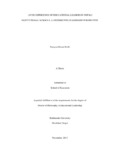Please use this identifier to cite or link to this item:
http://archive.nnl.gov.np:8080/handle/123456789/111| Title: | Lived experience of education leaders in Nepali institutional schools : a distributed leadership perspective |
| Authors: | Kafle, Narayan Prasad |
| Keywords: | Leadership Teacher |
| Issue Date: | 26-Feb-2018 |
| Abstract: | This study is meant for enhancing the understanding about being leaders at different levels in Nepali institutional schools from the perspectives of distributed leadership, a new „theorem‟ of leadership that postulates the idea that school organizations at the current time of complexities and uncertainty require the leadership roles to be distributed or stretched over everyone in school organizations. In this hermeneutic phenomenological study, I explored the lived experiences of nine educational leaders from top, middle and bottom levels in Nepali institutional schools. My question for this investigation asked, „What does it mean to be an educational leader?‟ I negotiated with the data I generated through interview and protocol writing by the participants using a rigorous six stage meaning making schema and there emerged seven themes to explicate the lived experience of being leaders at each level. Three metaphors emerged from my prolonged engagement and dialogue with nine research participants and from the textual artifacts they provided to me. I used the metaphor „accessing a labyrinth‟ to explicate the lived experience of being top level leaders as the leaders in the apex significance of school organization revealed that they felt confused, uncertain, and disorientated. It appeared to me that they were indecisive and experienced the trauma of being at the top. Considering their traumatic feelings of being executive leaders and toxic work environments, they articulated that distributed leadership was yet to be internalized by them. I used the metaphor „waiting for Godot‟ to explicate the lived experience of middle level leaders as they narrated their experience of being in the middle as an enigmatic undergoing with a sense of relegation having very little opportunity to grow due to their exclusion in the decision making. The middle level leaders signified the presence of leadership plus aspect only. They felt being marginalized and relegated to everyday administrative jobs. Likewise, I used the metaphor „burning like a candle‟ to emulate the lived experience of being at bottom level where the teacher leaders, I understood, experiencing a sense of excessive exploitation, exclusion and marginalization with very minimal opportunities for growth and they were struggling for the existence. It gave me the impression that being at the top was more a traumatic, being in the middle was an enigmatic and being at the bottom was a pathetic experience. However, there were occasions when they experienced a high sense of contentment, realized the possibilities for growth and felt proud of being in the noble profession. When I envisaged these lived experiences from distributed leadership perspective, I concluded that the institutional schools were not prepared to internalize the spirit of distributed leadership which I understood as a Utopian model of educational leadership that imagined a perfect harmony among leaders, followers and the situation. This conclusion suggested for various policy (need for recognition), practice (valuing each other), and future research implications (need for micro studies). |
| Description: | A thesis submitted to School pf Education in partial fulfillment of the requirements for the degree of Doctor of Philosophy in Educational Leadership, Kathmandu University,Nepal, 2013. |
| URI: | http://103.69.125.248:8080/xmlui/handle/123456789/111 |
| Appears in Collections: | 300 Social sciences |
Files in This Item:
| File | Description | Size | Format | |
|---|---|---|---|---|
| PhD_thesis_Narayan_Kafle_final.pdf | 1.36 MB | Adobe PDF |  View/Open |
Items in DSpace are protected by copyright, with all rights reserved, unless otherwise indicated.